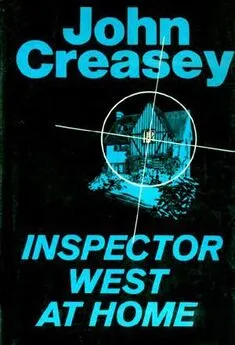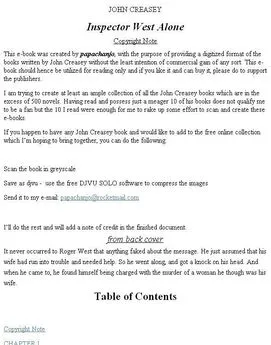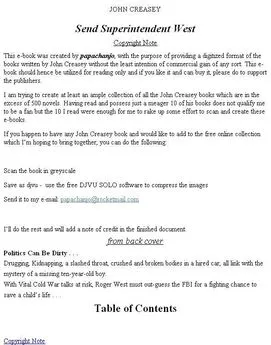John Creasey - Inspector West At Home
- Название:Inspector West At Home
- Автор:
- Жанр:
- Издательство:неизвестно
- Год:неизвестен
- ISBN:нет данных
- Рейтинг:
- Избранное:Добавить в избранное
-
Отзывы:
-
Ваша оценка:
John Creasey - Inspector West At Home краткое содержание
Inspector West At Home - читать онлайн бесплатно полную версию (весь текст целиком)
Интервал:
Закладка:
Roger replaced the receiver, then called the London Hospital. He was given a good report on Pep Morgan. He walked along to Chatworth’s office. One or two men passed, staring at him in surprise and one of them asked him what he had done to his face.
Roger grinned painfully. Tobacco smoke stung his lips and he knew that he was a fool to smoke but could not bring himself to throw the cigarette away. He tapped on Chatworth’s door and was bidden to enter.
Chatworth was sitting back in his big chair, Abbott standing like a statue beside him; the tape-recorder in Chat- worth’s office was near his hand, a tape — the tape — was in front of Chatworth.
“Hallo, West,” said the AC. “You’ve had a nasty time, I hear. Sit down.” Roger did so. “Anyway, the air is much clearer,” said Chatworth.
“Thank you, sir,” Roger said. It was difficult to speak and his words were inclined to run into one another.
Chatworth tapped the tape.
“I propose to take this as conclusive,” he said. “I must admit I’m bewildered.” For Chatworth that was a great admission. “I could not bring myself to believe that anyone would go to such lengths to frame you.” He hesitated, his round face sombre — “it remains hardly credible.”
“I suppose not, sir,” mumbled Roger. Was he still doubtful ? He decided that it was not a question of doubt but of sheer bewilderment, and he felt better although the mood of exhilaration had passed. “Have you heard about the unlucky 13th?”
“Yes.” Chatworth indicated two manila folders on his desk. “Here are your reports for December 13th — it can only be the 13th of December.”
“Of course,” said Roger, his heart beating faster. “Have you looked through them ?”
“I’m leaving it to you,” said Chatworth. “But are you up to it just now?”
“I ought to try,” Roger said. He pulled his chair nearer the desk, as the folders were pushed towards him. “Was there any other indication about my alleged misdemeanours ?” The question sounded absurdly formal. He knew that the evidence of the bank pass-book must have seemed conclusive enough and yet there was a lingering doubt.
“Yes,” Chatworth answered. “There were statements that you had conspired with the man Malone, to warn him if action were to be taken against him.”
“Who made the statements?”
“Joe Leech,” said Chatworth. “There were other things which we won’t worry about now. If I were you I would go home and get some sleep. You’ll feel much fresher tomorrow. But if you insist on looking through those files —”
“I would like to.”
Ten minutes later, puzzled and frustrated, he pushed them away. There was nothing which gave him any idea as to why he had been victimised because of a discovery made on December 13th. Certainly nothing he had put in his reports was important enough to have worried Pickerell so much. The only thing of importance on the day had been a visit to a house in Battersea, where a man had murdered his wife. It had been a miserable affair, brightened only by the solicitor who had taken on the murderer’s defence. He sat back after he had told Chatworth so and the glimmering of an idea entered his mind, only to fade again. It reminded him of his flash of doubt concerning Antoinette Cartier. It faded as swiftly but made him feel uncertain and a little irritable. His eyes felt as if they were filled with grit and his tongue was like a plum against his lips.
“I spent most of the day clearing up the Battersea murder,” he said. “The man Cox had murdered his wife and buried her beneath the kitchen floor of a hovel in Battersea. Oli- phant looked in while I was at the house. The other things were trivial, sir, just detail.”
“Get off home,” Chatworth said. “You’re too tired to think clearly.” He rounded the desk and held out his hand. “Your suspension is lifted, West.” His handclasp was very firm.
“Thank you, sir,” said Roger, stiffly.
“And I’m also sorry,” said Abbott, when they were walking along the passage outside. “I had my work to do, you know that. I thought there was no doubt at all.”
Roger smiled, painfully. “If there was even more evidence than I’ve yet heard, I can’t blame you.”
“I should have kept an open mind,” Abbott said. “I tried to trap you, West — I told you as nearly as I could that I was coming to see you that afternoon, then I sent Martin to shadow you. I expected you to make a call on the way.” The Superintendent broke off. Roger could understand how difficult he found it to make this admission.
“Forget it,” said Roger. “There is one thing.”
“Yes?”
“Why didn’t you detain me?”
Abbott shrugged. “We wanted to give you plenty of rope.”
Roger said : “And you’ve no idea what I was supposed to be hiding?”
“None at all. I hoped we would get information from Leech.” They were walking down the steps of the Yard, then, towards the Embankment; the moon was shimmering on the sluggish Thames and the dark silhouettes of barges were moving down river. One hooted, mournfully. A car-horn sounded not far away and a lorry clattered along the Embankment, a ghostly thing with its faint lights. “You have no idea where to find Malone, I suppose?”
“No,” said Roger. “I wish I had !”
“I’ll drive you home,” said Abbott.
“Not home — Buckingham Palace Gate,” Roger said, and then stopped abruptly, remembering Lois; he had quite forgotten her while he had been with Chatworth. His mind was too clouded, he should not have tried to think, it only gave him a headache and depressed him. He went on : “There’s one other thing you should know. I’ve got the girl who helped Pickerell.” Hastily, he went on : “Oh, I haven’t kidnapped her! She is willing enough to take help, but she won’t make any statement. Pickerell was blackmailing her. I think it would be a mistake to interview her officially.”
Abbott did not answer immediately.
“She might be able to give us a line if she’s treated well,” Roger went on. “But I believe she’s so frightened of the police that she would stay dumb.”
Abbott gave a thin laugh; with a shock, Roger realised that he had never heard the Superintendent laugh before.
“We owe you some licence,” Abbott said.
He did not even ask where Lois Randall was staying. Nor did he get out of the car outside the hotel, but wished Roger good night and then drove off, after promising to send men to help guard the hotel. Roger watched the rear-light fade into the grey pallor cast by the moon, then stepped towards the front door. One of Morgan’s men said : “Good night, Mr West.” There was no night porter and he had no key, but
Legge, a rotund, jolly individual, came to the door promptly. After he drew back bolts there was a noise of chains being moved — Legge was taking no chances.
Roger felt a twinge of alarm.
“Is everything all right ?”
“Why, yes, Mr West,” said Legge. “Why shouldn’t it be? I believe your wife is in the upstairs lounge.” The light in the hall revealed his wide smile.
“ Roger !” called Janet. She came to the head of the stairs and into his arms. “Darling, I get the most horrible ideas these days, I’m as touchy as —” she broke off, for he winced when she kissed him. “Roger, what is it ?”
“I — er — I banged into a door,” mumbled Roger.
“I don’t believe it!”
When she saw his face she refused to allow him to talk, although Mark and young Tennant, also in the lounge, were obviously disappointed. Roger said enough to make them realise that he had had another encounter with Malone.
Nothing was clear to him. He did not even realise that Janet sent a lugubrious Mark to an all-night chemist near Victoria Station for some zinc ointment to put on his lips. When he undressed his limbs felt like lead, his head throbbed. He was soothed by Janet, as she helped him, but half-asleep when the salve was rubbed in. Janet’s face was outlined against the electric light, which she had covered with a handkerchief to save his eyes from glare. It made her hair look radiant and her face soft and lovely.
When he woke up it was nearly ten o’clock.
Janet, in a dressing-gown, came in from the bathroom and the opening door disturbed him. He opened one eye; the other was stuck. He heard her exclaim. He tried to speak but his lips were far too swollen. Only after he had managed to swallow a cup of lukewarm tea and eat some porridge did he feel better in himself. Even then he had to admit that he would not be much good that day.
After twelve o’clock Janet brought in a lotion to reduce the swelling at his eye, which was badly discoloured, and his lips. Abbott telephoned to tell him not to come in. Later, he sent the two five pound notes from the £1,000 which
Morgan had found in his bedroom to the Yard, with a note asking if they could be traced; he might learn something from them.
He kept going over the case of the man Cox, who had murdered his wife and buried her beneath the floorboards of the kitchen.
He persuaded Janet to let him send for the complete file of the December 13th case and spent the afternoon brooding over it. It was sordid, unpleasant and unremarkable. The motive had been greed — the man’s wife had been on bad terms with her husband and had hoarded several hundred pounds in the house. Relatives had first suspected that something had happened to her and the case had followed its usual course — once suspicions were aroused, and the body found, it had been a mere matter of routine. There seemed no possible mistake, certainly nothing which had not been disclosed during the course of the investigation.
Mark Lessing and Bill Tennant went out during the afternoon, too restless to stay indoors. Lois Randall stayed in; during tea, she seemed unable to remove her gaze from Roger’s battered face.
Abbott, showing a solicitude quite out of character, telephoned to say that there was no trace of Malone, who had left his home in Stepney, nor of his men, nor of Pickerell. There was nothing to report from the office of the Displaced Persons’ Society except — Abbott seemed ill at ease when he admitted this — that the offices had not been guarded all the time after the fire and there was evidence that Malone had visited the place and discovered the tape-recorder. The overeagerness of Cornish doubtless explained the lapse, for the office should have been watched. It was reasonably obvious that Roger had been seen to go to Mrs Cartier’s flat, and that Malone or Pickerell had guessed it was her tape-recorder.
In spite of the quiet day, Roger was glad enough to get to bed just after eleven o’clock. His face was much better and Janet said, optimistically, that the scars would hardly be noticeable in the morning.
To their mutual surprise she was right. The lotion had performed miracles and his lips had healed, although he still found it difficult to eat or drink anything hot.
He went round to the Yard and saw Chatworth and Abbott, as well as an enthusiastic Cornish — his eagerness unaffected by the slip at the Society’s office, and an “I-told- you-so-Handsome’ Eddie Day, as well as a number of sheepish individuals who took the opportunity to say that they had always been sure it would all prove a mistake. Chatworth gave him chapter and verse of the ‘case’ against him, including reports that he had been to visit Malone (until then hardly known to the Yard). Joe Leech had given categorical evidence that Malone had boasted that he had West in his pocket. Cornish had assessed Malone merely as a nuisance, before his transfer from the Division to the Yard, and the Division had continued to make that grievous mistake.
Читать дальшеИнтервал:
Закладка:










